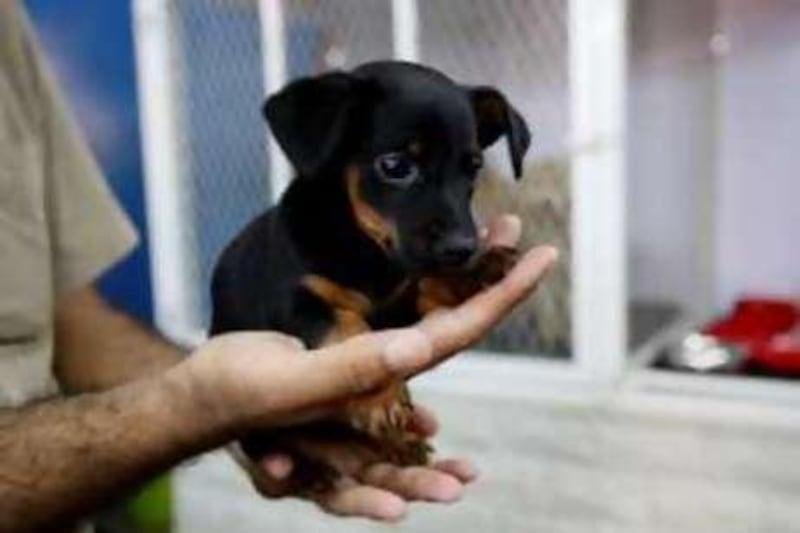ABU DHABI // Pet shops in Al Mena souk have drastically improved conditions for their animals following rigorous and regular inspections by the municipality. In an article last month, The National highlighted cases of animal cruelty, malnutrition, disease and neglect at the pet stalls at the market. At Essam Mustafa's shop, where three weeks ago filthy dogs were lying in their own urine and faeces in small rusty cages, yesterday dogs were in new and bigger cages with wire mesh floors that allowed waste to fall into trays below.
"This store had received its final warning the day The National published its story," said Raif Arnaout, an inspector with the Abu Dhabi Department of Municipal Affairs' Public Health Division. "It was facing having its licence cancelled. Since that time, the owner has moved out the rusty cages and put in new, larger ones." Mr Mustafa said he had spent nearly Dh30,000 (US$8,167) on new cages and renovating the shop in the past three weeks. He said he had been forced to spend the money if he wanted to stay in business.
"In addition, I have reduced my stock of dogs so that there is no more overcrowding and I have put up a reflective window tint to keep the store cooler and to prevent anyone from seeing the dogs from the outside and banging on the windows, thereby frightening the dogs," he said. He proudly pulled out the shop's "report card", which he has to turn in to the municipality every month. Inspectors sign it when they conduct inspections. The shop had been awarded a grade five, the highest available, in the past few daily inspections.
At the front line of the battle against cruelty to animals is Khaleefa Mohammed al Romaithi, head of the slaughterhouses division with the Abu Dhabi Department of Municipal Affairs' public health division. Charged with ensuring that animal welfare standards are met at slaughterhouses, pet stores and farms, he heads a team of professional veterinary inspectors such as Mr Arnaout, who have the power to fine shops, shut them down, revoke licences and confiscate animals.
"People are now beginning to see the pleasure of bringing an animal into their home and caring for it," Mr Romaithi said. "It is my department's responsibility to oversee that those animals are well cared for and kept in a sanitary environment at the places where they are sold so that they are disease-free when they are brought into the home." Mr Romaithi invited The National to accompany Mr Arnaout this week on an inspection of the souk.
"I want to show your readers how things have improved drastically in the past three weeks since your newspaper published its story," Mr Romaithi said. "Things are not perfect but soon they will be. Almost two years ago, the situation was very loose. There were very few regulations dealing with, and no inspectors specialised in, animal welfare. Things are very different now." Mr Romaithi and Mr Arnaout are behind a set of regulations recently passed on animal welfare aimed at maintaining public health.
"The main purpose of the slaughterhouses division is to develop and enforce regulations that serve to protect the public's health," Mr Arnaout said. "This is done through developing regulation, through informational campaigns and, as you will see today, by conducting surprise inspections." At a shop where, three weeks ago, a fluffy Pomeranian was under constant attack by two cocker spaniels in the same cage, conditions had improved. There was only one dog per cage and the fur on the Pomeranian's tail and hind legs was growing back.
Another shop previously caught selling puppies too young to be separated from their mothers had been banned from selling dogs. Mr Arnaout said it now only had a licence to sell birds and fish. The shops he visited showed report cards indicating that most were being inspected daily or every second day. The longest period between inspections for any shop was four days and most were being given a grade of four or five. Those receiving grades of three and two were given a chance to improve or face fines.
"Shops that receive the lowest grade of one are immediately closed down and their licence is put under review," Mr Arnaout said. Back at the slaughterhouses division's headquarters, Mr Romaithi said although conditions had improved, they were not yet perfect. "There remains a great deal that has to be done. Those who work in pet stores have to be educated in caring for the animals in their care and the general public also has to be taught about animals and how to best care for them."
He said a hotline had been set up to receive questions on animal welfare. The phone number is 993. "If anyone calls, their questions are immediately answered and if someone reports a violation, our inspectors will be on site within 30 minutes to investigate." @Email:ealghalib@thenational.ae






